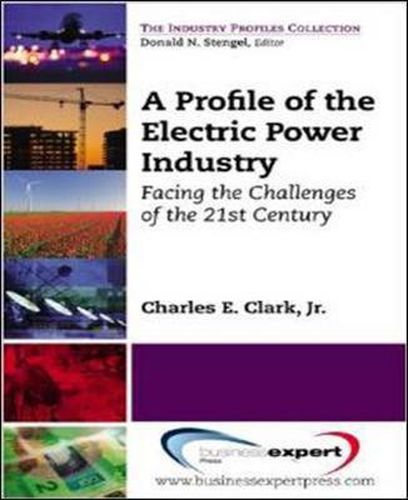Readings Newsletter
Become a Readings Member to make your shopping experience even easier.
Sign in or sign up for free!
You’re not far away from qualifying for FREE standard shipping within Australia
You’ve qualified for FREE standard shipping within Australia
The cart is loading…






This title is printed to order. This book may have been self-published. If so, we cannot guarantee the quality of the content. In the main most books will have gone through the editing process however some may not. We therefore suggest that you be aware of this before ordering this book. If in doubt check either the author or publisher’s details as we are unable to accept any returns unless they are faulty. Please contact us if you have any questions.
The electricity industry plays an important role in the US economy. Electricity is used in the vast majority of economic activity and consumption. The business is very capital intensive and is a significant part of the economy. In addition the characteristics of the industry illustrate many important concepts in economics. This book is designed to provide information about the industry to students and the wider public. The student audience includes those studying business, economics, public policy and the engineering disciplines required by the electricity industry. Public policy makers, investors, regulators and electricity industry employees will also benefit from this book. This book will allow readers to be able to develop informed opinions about the current status and future directions of the electricity industry. It begins by describing how the industry operates by converting fuels into electricity, transporting it to the place of use and designing retail products that provide the electricity to end use customers. These activities are conducted by organizations that can differ in ownership type (profit making or non-profit public organizations) and by the part of the industry value chain that they specialize in. Regulation plays a huge role in the electric industry. Since many industry functions are considered natural monopolies the companies are often granted a monopoly franchise to provide services under regulated prices. The industry has undergone a significant amount of technical, economic and regulatory change during its history. Looking forward the electricity industry will likely see even greater change as problems such as new technologies, climate change and increased demand for electricity use create significant challenges. The success of the industry will depend on identifying and managing the opportunities to mitigate the risks associated with these challenges.
$9.00 standard shipping within Australia
FREE standard shipping within Australia for orders over $100.00
Express & International shipping calculated at checkout
This title is printed to order. This book may have been self-published. If so, we cannot guarantee the quality of the content. In the main most books will have gone through the editing process however some may not. We therefore suggest that you be aware of this before ordering this book. If in doubt check either the author or publisher’s details as we are unable to accept any returns unless they are faulty. Please contact us if you have any questions.
The electricity industry plays an important role in the US economy. Electricity is used in the vast majority of economic activity and consumption. The business is very capital intensive and is a significant part of the economy. In addition the characteristics of the industry illustrate many important concepts in economics. This book is designed to provide information about the industry to students and the wider public. The student audience includes those studying business, economics, public policy and the engineering disciplines required by the electricity industry. Public policy makers, investors, regulators and electricity industry employees will also benefit from this book. This book will allow readers to be able to develop informed opinions about the current status and future directions of the electricity industry. It begins by describing how the industry operates by converting fuels into electricity, transporting it to the place of use and designing retail products that provide the electricity to end use customers. These activities are conducted by organizations that can differ in ownership type (profit making or non-profit public organizations) and by the part of the industry value chain that they specialize in. Regulation plays a huge role in the electric industry. Since many industry functions are considered natural monopolies the companies are often granted a monopoly franchise to provide services under regulated prices. The industry has undergone a significant amount of technical, economic and regulatory change during its history. Looking forward the electricity industry will likely see even greater change as problems such as new technologies, climate change and increased demand for electricity use create significant challenges. The success of the industry will depend on identifying and managing the opportunities to mitigate the risks associated with these challenges.